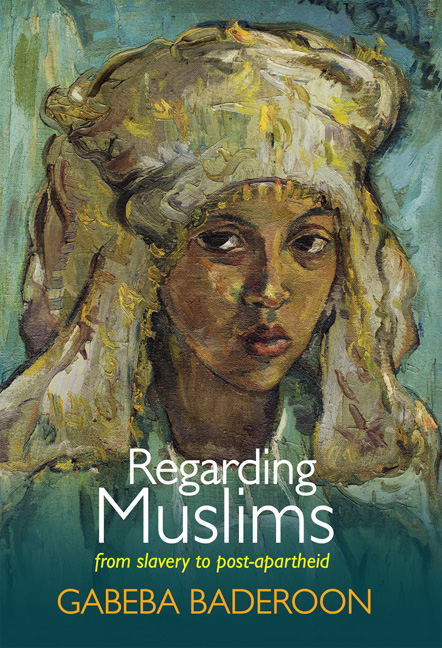Book contents
- Frontmatter
- Contents
- List of illustrations
- Acknowledgements
- Foreword
- Introduction: Beginnings in South Africa
- Chapter 1 Ambiguous Visibility: Muslims and the making of visuality
- Chapter 2 “Kitchen Language”: Muslims and the culture of food
- Chapter 3 “The Sea Inside Us”: Parallel journeys in the African oceans
- Chapter 4 “Sexual Geographies of the Cape”: Slavery, race and sexual violence
- Chapter 5 Regarding Muslims: Pagad, masked men and veiled women
- Chapter 6 “The Trees Sway North-North-East”: Post-apartheid visions of Islam
- Conclusion
- Notes
- Glossary
- Bibliography
- Index
- Plate section
Introduction: Beginnings in South Africa
Published online by Cambridge University Press: 21 April 2018
- Frontmatter
- Contents
- List of illustrations
- Acknowledgements
- Foreword
- Introduction: Beginnings in South Africa
- Chapter 1 Ambiguous Visibility: Muslims and the making of visuality
- Chapter 2 “Kitchen Language”: Muslims and the culture of food
- Chapter 3 “The Sea Inside Us”: Parallel journeys in the African oceans
- Chapter 4 “Sexual Geographies of the Cape”: Slavery, race and sexual violence
- Chapter 5 Regarding Muslims: Pagad, masked men and veiled women
- Chapter 6 “The Trees Sway North-North-East”: Post-apartheid visions of Islam
- Conclusion
- Notes
- Glossary
- Bibliography
- Index
- Plate section
Summary
Since the colonial period, popular culture has trained a fascinated and uninhibited gaze on Muslims in South Africa, evident in the abundance of images of “Cape Malays” (a term for Muslims which I discuss below) in travel writing, cartoons, paintings, caricatures and cookbooks produced from the eighteenth century onward. In these images, Muslims are typically presented as exotic, submissive and static, and the representations are overwhelmingly associated with the past. Revealingly, even in the earliest cookbooks published in South Africa, writing about Muslim food is almost always characterised by nostalgia, a longing for what is nearly lost or on the point of being forgotten. Such picturesque Muslim figures thus imply pastness, evoking not only what is to be remembered, but what is to be forgotten. In this book, I argue that this conventional portrayal of Muslims enables certain histories to be forgotten.
An extensive record of cartoons, popular paintings and cookbooks has created a familiar repertoire of Muslim figures in the South African imagination, a repertoire infused with larger political meaning. Images of kindly Malay washerwomen and cooks and submissive Malay men reflect a comfort with the intimate presence of Muslims, but also erase the trauma of slavery – through which Islam first entered the South African colonies. While the topic of slavery and Islam has receded in other arenas of public culture, popular culture has continued to linger with familiarity and even pleasure on images that allude obliquely to slavery. Through a charged play of visibility and invisibility, the long fascination with images of Muslims in the popular realm thus holds a revealing diagnostic power.
“To regard” denotes both “to look” and “to respect”, “to stare” and “to contemplate”, “to gaze” and “to consider”. These dual meanings suggest the act of looking thoughtfully, of reflecting, with an attitude either of intimacy or distance. The title of this book uses the word “regarding” in the present continuous form, intending the act of looking to be sustained and critical. “Regarding” also suggests being at a certain remove – that the perspective taken in the book stands back from Muslims and is about, or in connection to them, which connotes a broader and looser relation. The title therefore signals the act of looking directly and continuously at Muslims, yet it also includes a more diffuse meaning.
- Type
- Chapter
- Information
- Regarding Muslimsfrom slavery to post-apartheid, pp. 1 - 26Publisher: Wits University PressPrint publication year: 2014



